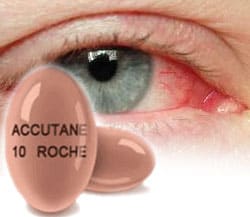
A new study has associated the acne medication Accutane (isotretinoin) with an increased chance of developing some form of eye disorder. According to a report from HealthDay News, researchers at Tel Aviv Medical Center in Israel have found that people taking Accutane in are nearly twice as likely to develop an ocular adverse effect than […]
 A new study has associated the acne medication Accutane (isotretinoin) with an increased chance of developing some form of eye disorder.
A new study has associated the acne medication Accutane (isotretinoin) with an increased chance of developing some form of eye disorder.
According to a report from HealthDay News, researchers at Tel Aviv Medical Center in Israel have found that people taking Accutane in are nearly twice as likely to develop an ocular adverse effect than people not taking any acne medications. The study has been published in full in the journal Archives of Dermatology.
To complete the study, researchers focused on more than 14,000 cases in which a teen or young adult was prescribed Accutane in the treatment of moderate to severe acne. Isotretinoin is most often prescribed in the treatment of acne vulgaris, a severe form of the skin condition that affects mostly teens and younger adults.
The study used a database of patient records gathered in Israel. Of those, nearly 14 percent had developed some form of ocular adverse event, such as conjunctivitis. That risk dropped to below 10 percent among people taking another form of acne medication, and was just more than 7 percent among people taking no acne medications. After a year of follow-up treatments, people still taking Accutane carried a greater risk of developing “inflammatory and structural adverse effects,” according to the report on the study.
Isotretinoin, according to the study, dries the eyes and robs them of lubricant, increasing the chance of infections or other maladies affecting the eyes. The adverse effects were caused mostly by changes to the eyelids while taking isotretinoin. Among the cases reviewed for the study, blepharoconjunctivitis, keratoconjunctivitis sicca, cutaneous photosensitivity, contact lens intolerance, refractive changes, papilledema, pseudotumor cerebri, and abnormal retinal function, were reported. In total among the study group, there were nearly 2,500 adverse effects reported among people taking isotretinoin, including abnormal meibomian gland secretion, blepharoconjunctivitis, corneal opacities, decreased dark adaptation, decreased tolerance to contact lenses, decreased vision, increased tear osmolarity, meibomian gland atrophy, myopia, ocular discomfort, ocular sicca, photophobia, pseudotumor cerebri, and keratitis, according to an abstract gleaned from the study. Blepharitis and conjunctivitis were the most commonly reported side effects of taking isotretinoin.
The conditions caused by taking this acne medication were primarily temporary or short-term but researchers concluded that prescribing physicians should make their patients fully aware of the risk factors associated with taking Accutane over another form of acne medication. All the adverse effects reported in the study were alleviated when a patient stopped taking isotretinoin.


